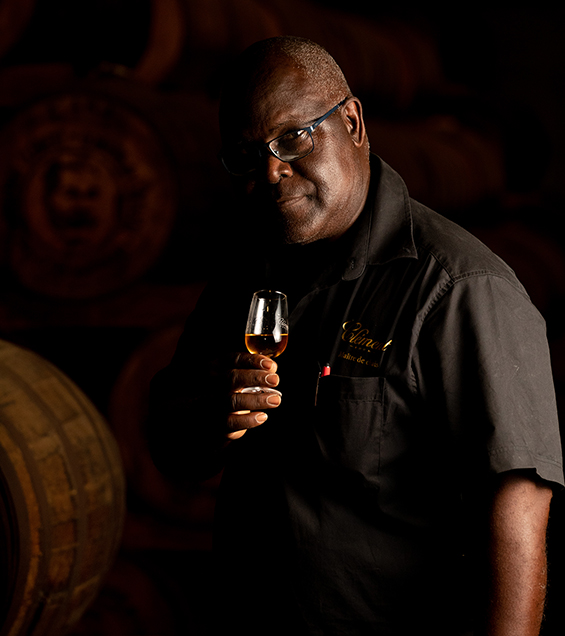Rum Connoisseur Interview of the Week ROBERT PERONET Cellar Master at Rhum Clement
Rum Connoisseur
Interview of the Week

ROBERT PERONET
Cellar Master at Rhum Clement
1. Who is Robert Peronet?
I am the Cellar Master at Rhum Clément and have been for the past thirty years. I started as a technician in a sugar factory where we also produced molasses rum. My developing interests took me to further my career training at the Technical Center of Sugarcane. I came to Habitation Clement and I was immediately challenged with the responsibility to develop a new premium flair for our aged rums. It was around this time we developed a long plan to keep more aged rhum stocks and to further diversify what we are capable of offering. Our protocols today for white distillate selections, choices of oak, toasting and conditioning, preparation, blending, and tasting has been a work in progress for the last three decades.
2. What does the rum mean for you? What made you fall in love with rum and when did it happen?
Rum is a product to which I have devoted a great deal of time in my life, perhaps even more than to my family. I have no regrets because the rum has offered me a very nice career during which I was able immerse myself in the world of spirits. I have discovered a community of wonderful people to work with passionately elevating the quality of spirits.
When I started working in the world of rum, going back more than 30 years, Rhum Agricole did not yet have its credentials. While the AOC always has had its restrictions, it has its many advantages, which have allowed me to extend our range. It has been with great enthusiasm that our team has masterfully played with various new rum projects. Every phase of each of our new rum releases is exciting. I feel the world is reaching a level of appreciation for rum that I have had since I was a young man. We can really stretch our legs and continue to release new flavors and styles for the curious new consumer. The rum industry is in a great place and I am confident for its future.
3. What are three essential characteristics that define your rum according to your perspective?
The first characteristic would be the raw material and its development. At Habitation Clément, we have distinctive rhums made directly from sugarcane juice. Our style is light and grassy derived from our relatively short fermentation periods of 24 to 36 hours. Our rhums are easy to pick out in a crowd of other rums from molasses.
One important feature for me is the necessary rest time post distillation. Before we bottle white rhum or put the rum in an oak barrel for aging, the fresh distillate rests in large conditioning vats for a minimum of 6 weeks according to the AOC. We have some rums that stay longer. This is important preparation time for our rhums to equilibrate as we begin to slowly add water to allow for mellow reduction. This slow drip of water integrating with the rhum allows for the fresh aromas from distillation to carry through the length of the aging. Our rhums have excellent body and balanced floral and fruity flavors from the quality of the pure rhum we start with.
4. What is your favorite place for drinking rum?
Rum is a festive product. I always prefer to consume it with friends and especially with enthusiasts like myself. It is through these exchanges that we give true value to rum, surrounded by people who wish to learn more, to quench their curiosity, trade knowledge, and debate too!
Any criticism, positive or negative, is good to take because it allows us to move forward and appreciate the quality of the product. A proper tasting should not be done alone. A 360-degree perspective of the quality of a rum cannot have one judge and cannot be determined by one part. Personal exchanges during the time of the tasting are important to determine the quality of the spirit, whether I am in the lab with my team or in a festive setting with friends and family.
5. What is your favorite drink + recipe?
This is a difficult question because I offer a wide choice. Often, I am asked what I like most between white rum and aged rum. I do not have a precise answer. Everything is relative. As an aperitif, white rum is something very standard in a classic Martinican Ti’ Punch, with very little natural sugar, a fresh lime coin lime pressed into a small glass. I am a bit of a purist. For the occasion of a digestif, I prefer an extra aged rhum neat in a simple glass with a stem. My favorite is the 10-year-old Clement, an elegant aged rhum with great legs and pronounced aromas. For me, it is the rhum that represents the core competency of our aged rhums.
6. Why is it important to educate the rum consumer?
It is true that we must educate the consumer because we produce a noble and complex product that delivers a smooth experience engrained in our culture. I think our people like to know what they are drinking, who made it and how. Our consumer wants to understand its many characteristics. The way we are making rhum is not difficult to understand. It has been done this way for many generations. We continue to honor the tradition by continuing to open doors to more flavors and aromas. It is great to see the consumer become more a part of this.
7. Any tips to train the palate and taste a good premium rum?
I think many people have a good chance to be a good taster; it is just a matter of training. This is a lot to play, and you must have a memory bank of different sensory experiences. Some people are more sensitive to certain aromas than others and can therefore smell them more quickly. As far as memorization is concerned, I always advise to associate an image with the aroma that we taste.
8. What plans do you have when you leave the rum industry?
I am committed to ensuring real continuity with our aged rhums. I am confident in my successor, Julien Thimon. I am slowly handing him my clipboard and the keys to the cellars. I am staying on this year mainly to be sure the relay is done properly. I am not leaving empty cellars. We have recently increased the quantity of barrels with the addition of new cellars. These rhum are aging vibrantly and I think I will always stick around and watch our barrels aging rhum. I will check in with the team, I am confident about that.
9. Why is the role of the bartender important in the rum industry?
For me bartenders have a very important role because our rhums serve as the base of their creations. We have hosted some international bar competitions here, and I have had bartenders show me flavors with the rhum I could never create. Thanks to their cocktails, the rhum evolves again. It is amazing to see white rum cocktails, aged rhum cocktails, and tiki cocktails. Bartenders are giving the rum industry a boost. Typically, I only enjoy rhum simply dressed in a little sugar. Learning about cocktails is another world.
10. What is your advice for new generations in the rum industry?
If the rum industry continues to mature and follow the premiumization trend, I believe rum is destined for a bright future. For the evolution to continue, there must be a commitment to continue to challenge each other and to find new qualities and gain further new accreditation for rum among spirit aficionados.
To our future generations, keep working! I believe that our major axis of progress is further development of aging and finishing. We should not hesitate to observe and learn from other parts of the globe, in the other categories of spirits. At the same time, our rhum DNA stays true as we remain on the path of those before us. We continue the path thinking globally, while we preserve our local roots.
11. What is the most important contribution you have made in the rum industry?
Almost unconsciously at the time, I developed the category of rhum agricole since I participated in the development of the specifications of the AOC Martinique, with many tastings and debate exchanges to define the aromatic profile so specific to this category. It has been one of my proudest contributions which have allowed the Martinique product to reach the standards of the AOC.
12. Benefits that the rum industry has given you.
The rum industry allowed me to discover a whole other world of other spirits. We train to be sensitive to everything around us and to the different distillates out there in the world. It is really an exchange of good processes that we may also want to learn from. I opened myself to a new diverse palate of aromas, sometimes unsuspected, in new barrel char conditions. I became more curious of what is behind the oak, the forests, and the sawmill. I have found new things to be passionate about thanks to rum.
13. How can people learn more about you? Website? Social media page?
I don’t do social media. But if you come to Martinique and come to Habitation Clément, ask for me.
14. So, which do you prefer? Sugar or syrup?
I prefer sugar, it’s a question of authenticity, it’s really the traditional Ti’ Punch. Syrup did not have the same place it has today in the preparation of punch.
15. Are you a sweet or dry Ti’ Punch?
Very little sugar of course! Why am I saying that? Because rhum agricole already has a sweet side, this roundness in the rhum, so no need to add much more. People of my day prefer without sugar, or very little sugar since the rhum itself already has everything it takes.
16. How do you cut your lime?
You must cut it in a bias that is when it gives the maximum juice. You must avoid cutting straight, to have the maximum zest, and always cut in strips.





